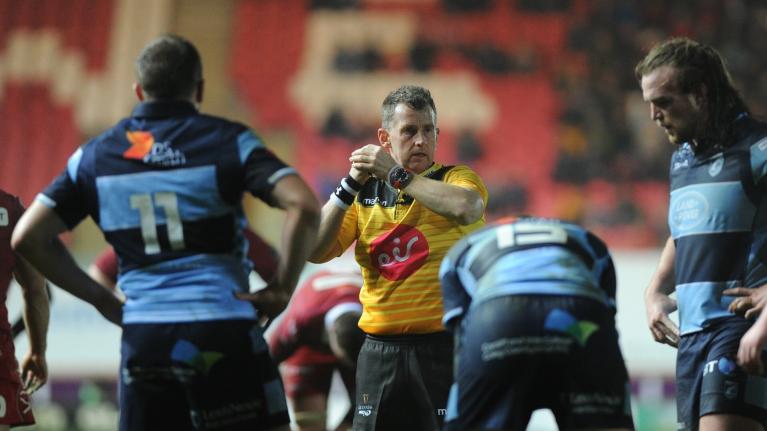After excessive penalty counts in NZ and England, Nigel Owens sizes up refereeing the PRO14 restart

Vetern Welsh referee Nigel Owens has called for patience amid fears that the Guinness PRO14 penalty counts will be as extreme as seen when other tournaments such as Super Rugby Aotearoa and the Gallagher Premiership returned to action following the lockdown.
The PRO14 got underway on Friday night in Italy following its five-month layoff with 30 penalties being awarded at Stadio di Mongio in a game won 17-13 by Zebre, and the tournament will continue across the weekend in Wales, Scotland and Ireland.
It was last April when World Rugby issued a law application guideline for the breakdown and that re-emphasis was a factor when competitions restarted in New Zealand and England. There were 60 penalties in the opening two matches in New Zealand in June, with 164 awarded in last weekend's six matches in England, an average of more than 27 per game.
Now the PRO14 is returning and following on from a statement issued by tournament organisers regarding its breakdown law application, referee Owens has touched on the subject ahead of taking charge of the Saturday fixture between Scarlets and Cardiff in Llanelli.
The PRO14 statement read: "Since the suspension of the Guinness PRO14 in March, World Rugby has issued a breakdown law application guideline that will be enforced in the tournament as of round 14.
"The core focus of this development is to ensure player welfare, while mitigating risks of injury and encouraging fair play on the pitch. Following extensive research on current trends and challenges, the specialist breakdown group recommended the strict reinforcement of the existing law as the most appropriate course of action."
Explaining his approach to putting this directive into action on the pitch, Owens wrote in his latest walesonline.co.uk column: "There’s set to be a tweak or two to the way things are overseen on the pitch and I’m optimistic games will improve as a result.
"It’s not that much of a change, really, focusing on the tackle area. Basically, when someone is trying to achieve a turnover, if the ball is slow to come away because the opponent isn’t letting go properly, the whistle will sound earlier.
"Last year it would have been two or three seconds before I intervened. This year it will be a second quicker to prevent the man trying to make the turnover from being cleared out in a dangerous position. Legal clear-outs will still be permitted. But we don’t want to see anyone being hit around the neck or head while they are trying to claim possession from an opponent. The spin offs could be more ball-in-play time, quicker rugby and more attractive games.
"It’s going to be a challenge to get it right in the short term for players and officials, so I’d appeal for a bit of patience. People will be rusty and it will take a few weeks for us to become comfortable with the new arrangements. No matter how much you prepare for them, it’s not the same as being in a match situation with the extra intensity that involves.
"We’ve seen that after a few problems in Super Rugby Aotearoa, with a high penalty count in the early games, things settled down and some of the matches were superb. Some referees appeared a bit quick on the whistle at first, which is understandable. And players took some time to adapt.
"But it didn’t take long for it to click and the games have been fluid and easy on the eye, with a decent job done by the men in the middle for the most part. Let’s hope that will be the case here."
Latest Comments
Great article Nic, it seems Lancaster would be a great fit for the wallabies. The attacking innovation and patterns he created at Leinster would be loved by the Aussie public. Perhaps even claimed as “the aussie way” haha. Off topic, but interested to know your thoughts on how the aussie tens are stacking up this season. Doesn’t seem like anyone is grabbing the jersey atm. And where does a veteran like JOC at the crusaders sit in the pecking order? He’s looking good, but helps having Jordan running off tour shoulder…
Go to commentsI wonder if he used his position to bully a great contract lol
Go to comments